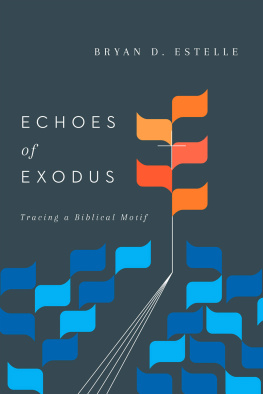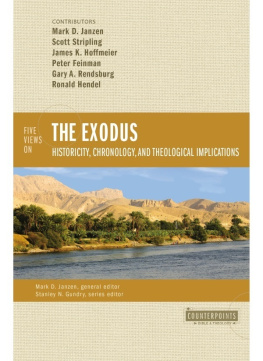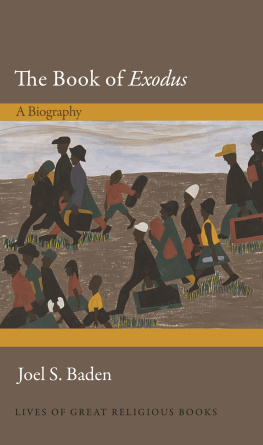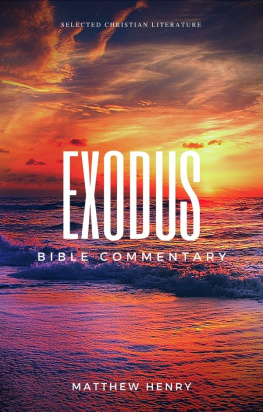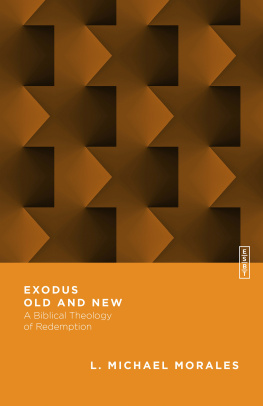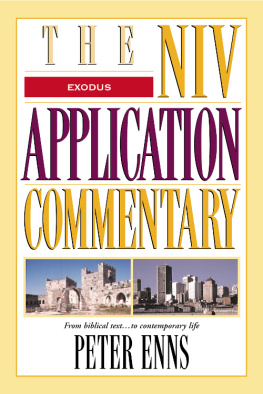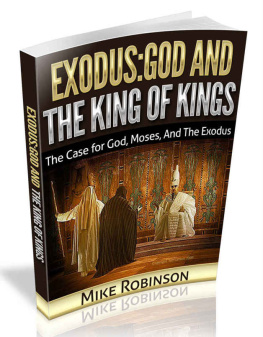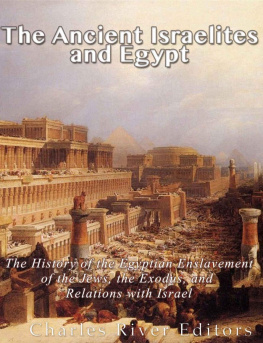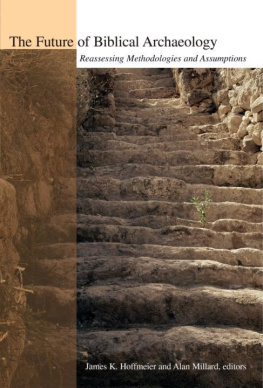Bibliography
Aberbach, M., and Smolar, L. 1967. Aaron, Jereboam and the Golden Calves. JBL 86:12940.
Abramsky, S. 1975. On the Kenite-Midianite Background of Moses Leadership [Hebrew]. Eretz-Israel 12:3539.
Ackerman, J. S. 1974. The Literary Context of the Moses Birth-Story. In Literary Interpretations of Biblical Narratives, edited by K. R. R. Gos Louis, with J. S. Ackerman and T. S. Warshaw. Nashville: Abingdon, pp. 74119.
. 1975. Prophecy and Warfare in Early Israel: A Study of the Deborah-Barak Story. BASOR 220:513.
Aharoni, Y. 1968. Arad: Its Inscriptions and Temple. BA 21:232.
. 1975. Arad Inscriptions [Hebrew]. Jerusalem: Mosad Bialik.
. 1979. The Land of the Bible: A Historical-Geography, rev. and enlarged ed., translated from the Hebrew and edited by A. F. Rainey. Philadelphia: Westminster.
Albright, W. F. 1925. The Administrative Divisions of Israel and Judah. JPOS 5:1724.
. 1938. What Were the Cherubim? BA 1:13.
. 1950. Baal Zaphon. In Festschrift Alfred Bertholet sum 80 Geburtstag, edited by W. Baumgartner. Tbingen: Mohr, pp. 114.
. 1954. Northwest Semitic Names in a List of Egyptian Slaves from the Eighteenth Century B.C. JAOS 74:22233.
. 1957. From the Stone Age to Christianity, 2nd ed. Garden City, N.Y.: Doubleday Anchor.
. 1961. Abram the Hebrew: A New Archaeological Interpretation. BASOR 163:3654.
. 1963. Jethro, Hobab and Reuel in Early Biblical Tradition, with Some Comments on the Origin of JE. CBQ 25:111.
. 1968. Yahweh and the Gods of Canaan: A Historical Analysis of Two Contrasting Faiths. Garden City, N.Y.: Doubleday.
. 1969. Archaeology and the Religion of Israel, 5th ed. Garden City, N.Y.: Anchor Books.
. 1975a. Moses in Historical and Theological Perspective. In Magnalia Dei, Essays in Honor of George Ernest Wright. New York: Doubleday & Co.
. 1975b. The Amarna Letters from Palestine. CAH, II, 2:98116.
Aldred, C. 1975. Egypt: The Amarna Period and the End of the Eighteenth Dynasty. CAH, II, 2:4997.
Aling, Ch. F. 1981. Egypt and Bible History from Earliest Times to 1000 B.C. Grand Rapids, Mich.: Baker.
Allen, T. G. 1936. Types of Rubrics in the Egyptian Book of the Dead. JAOS 56:14554.
. 1974. The Egyptian Book of the Dead. Chicago: University of Chicago Press.
Alt, A. 1968. The God of the Fathers. In Essays on Old Testament History and Religion, translated by R. A. Wilson. Garden City, N.Y.: Doubleday Anchor, pp. 3100.
Andreason, N. E. A. 1972. The Old Testament Sabbath: A Tradition-Historical Approach. Missoula, Mont.: Scholars Press, S.B.L. Dissertation Series No. 7.
Bacchiocchi, S. 1977. From Sabbath to Sunday, A Historical Investigation of the Rise of Sunday Observance in Early Christianity. Rome: Pontifical Gregorian University.
. 1980. Divine Rest for Human Restlessness. Rome: Pontifical Gregorian University.
Bailey, L. R. 1971. The Golden Calf. HUCA 42:97115.
Baines, J., and Mlek, J. 1980. Atlas of Ancient Egypt. Oxford: Phaidon.
Bakir, A. 1952. Slavery in Pharaonic Egypt. ASAE Supplement No. 18.
Baltzer, K. 1971. The Covenant Formulary, translated by David E. Green. Philadelphia: Fortress Press.
Barnett, R. 1975. The Sea Peoples. CAH, II, 2:35978.
Baron, S. 1971. Population. EJ 13:866.
. 1972. Ancient and Medieval Jewish History, Essays by Salo Baron, edited by L. A. Feldman. New Brunswick, N.J.: Rutgers University Press.
Barr, J. 1959. The Problem of Israelite Monotheism. TGUOS 17:5262.
Barrois, G. A. 1962. Mirror in IDB vol. 3:4023.
Bartlett, J. R. 1973. The Moabites and Edomites. In Peoples of Old Testament Times, edited by D. J. Wiseman. Oxford: Clarendon, pp. 22958.
Barton, G. A. 1917. Archaeology and the Bible. Philadelphia: American Sunday-School Union.
. 1929. The Royal Inscriptions of Sumer and Akkad. New Haven, Conn.: Yale University Press.
Bates, M. 19591960. Insects in the Diet. American Scholar 24:4649.
Batto, B. F. 1984. Red Sea or Reed. Sea. BARev 10, no. 4:5663.
Beyerlin, W. 1965. Origins and History of the Oldest Sinaitic Tradition, translated by S. Rudman. Oxford: Blackwell, pp. 12633.
. 1978. Near Eastern Texts Relating to the Old Testament, translated by J. Bowden. Philadelphia: Westminster.
Bimson, J. J. 1978. Redating the Exodus and Conquest. JSOT Supplement Series No. 5.
Blackman, A. M. 1921. On the Position of Women in the Ancient Egyptian Hierarchy. JEA 8:30.
Bleeker, C. J. 1967. Egyptian Festivals: Enactments of Religious Renewal. Leiden: Numen Supplement XIII.
. 1973. Hathor and Thoth: Two Key Figures of the Ancient Egyptian Religion. Leiden: Numen Supplement XXVI.
Blenkinsopp, C. J. 1975. The Position of the Queen in Ancient Egypt. Rainbow. Leiden: Brill.
. 1977. Prophecy and Canon. Notre Dame, Ind.: University of Notre Dame Press.
Bodenheimer, F. S. 1947. The Manna of Sinai. BA 10:26.
Boecker, H. J. 1980. Law and the Administration of Justice in the Old Testament and Ancient East. Minneapolis: Augsburg Publishing House.
Borghouts, J. F. 1978. Ancient Egyptian Magical Texts. Leiden: Brill.
Bratton, F. G. 1961. The First Heretic: The Life and Times of Ikhnaton the King. Boston: Beacon Press.
Breasted, J. H. 1906. Ancient Records of Egypt, vol. 3. Chicago: University of Chicago Press.
. 1961. The Dawn of Conscience. New York: Charles Scribners (reprint).
Brichto, H. Ch. 1983. The Worship of the Golden Calf: A Literary Analysis of a Fable on Idolatry. HUCA 54:144.
Brock, S. P. 1952. An Early Interpretation of pssah: aggn in the Palestinian Targum. In Interpreting the Hebrew Bible, edited by J. A. Emerton and S. C. Reif. Cambridge: Cambridge University Press.
Budge, W. 1960. The Book of the Dead. New York: University Books (reprint).
. 1969. The Gods of the Egyptians. New York: Dover (reprint).
. 1978. Egyptian Magic. Secaucus, N.J.: Citadel (reprint).
Cassuto, U. 1967. A Commentary on the Book of Exodus. Jerusalem: Magnes.
ern, J. 1951. The Greek Etymology of the Name of Moses. ASAE 51: 34954.
Childs, B. S. 1962. Memory and Tradition. London: Studies in Biblical Theology No. 37.
. 1965. The Birth of Moses. JBL 84:10922.
. 1974. The Book of Exodus: A Critical Theological Commentary. Philadelphia: Westminster.
Clark, R. E. D. 1955. The Large Numbers of the Old Testament. JTVI 87:8292.
Clarke, S., and Engelbach, R. 1930. Ancient Egyptian Masonry: The Building Craft. London: Oxford University Press; reprinted Boston; Milford House, 1974.
Clements, R. E. 1965. God and Temple. Philadelphia: Fortress Press.
Clifford, R. J. 1972. The Cosmic Mountain in Canaan and the Old Testament. Cambridge, Mass.: Harvard University Press.
Coats, G. W. 1968a. Despoiling the Egyptians. VT 18:45057.
. 1968b. The Murmuring Motif in the Wilderness Traditions of the Old Testament: Rebellion in the Wilderness. New York: Nashville.
. 1975. Moses versus Amalek: Aetiology and Legend in Exod. XVII:816. SVT 28:2941.
Cody, A. 1968. Exodus 18:12: Jethro Accepts a Covenant with the Israelites. Biblica 49:15366.


